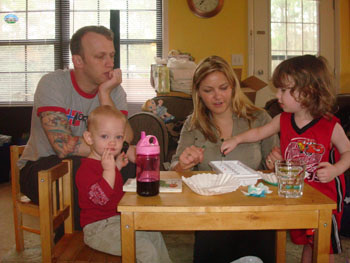What, you say, is executive functioning? Oh, parents know it well as they juggle (no pun intended...wait, pun intended) jobs, kids, in-laws, plumbing disasters, new brakes, the bills and the marriage. Executive functioning allows you to use your information and skills to "produce" something. It does no good to be the world's best brain surgeon if you never step into an operating room to save someone's life.
- Organizing
- Managing time
- Using working memory
- Planning
- Shifting gears
- Starting tasks
- Sticking with tasks
- Keeping yourself from behaving inappropriately
Just reading this list helps you to appreciate the struggle facing those with executive functioning deficits. Life is a day-to-day crisis.
Executive functioning skills that may not seem so straightforward include:
Monitoring: If you have monitoring deficits, you forget where you are in a process such as solving a math problem or you make careless errors. You start talking about one topic and veer off into others. You aren't checking in with yourself to see "how" you appear to others or you don't do a "quality control" check when working.
Metacognition: "Thinking about thinking" is metacognition. It involves having prior knowledge and knowing when, how and why to use strategies. It also involves the process of refining your approach if things don't work out the way you expected.


If you see your child, teen or college kid showing signs of executive functioning skills, consider that they may have ADHD. It's a serious disorder and needs to be addressed.
I find that many very bright kids who aren't "producing" in school have some version of ADHD. Let them perform to their potential. "Can you live with the consequences" if you don't?
First, understand where they are falling down. Look at the list and evaluate each kid's mastery of the skills.
Second, don't criticize them for it. They would love NOT to have these problems. It's a brain thing not a character flaw.
Third, get the teacher on board with your efforts to minimize the fall out from their disability.
Fourth, sit down with your child/teen and make a plan of action. Do not force your ideas of how they should get things done on them. They've got their own ideas. You need to be part of their team. I wrote a post a while ago called "You're All Talk, You're Tuned Out Kids". If you don't tell them what to do, but offer a menu of ideas, they'll be on board faster. Go online for ideas or check out the book "Coaching Students with Executive Skills Deficits" by Peg Dawson and Richard Guare. Really practical and useful ideas that don't require a graduate degree in child psychology.
Fifth, once a plan is in place check in with the kid and refine it as you move along. As they gain independence (takes time, practice and patience), they can fly on their own.
Consider your own executive functioning skills. Have any areas you can enhance? Need technology to help? iPhone alarms and other digital devices can keep you on track. Reduce the frustration. Go out to the car once and leave. Don't keep running back and forth because you forgot something...4 or 5 times.
Fatigue, stress and poor nutrition compromise executive functioning. Alcohol and drugs wipe it out altogether. Get some sleep!
TTFN!
Claudia





